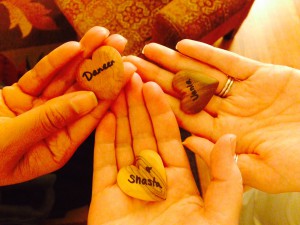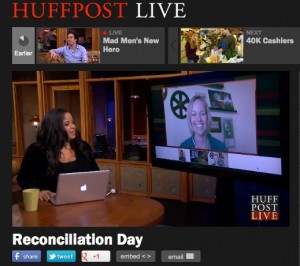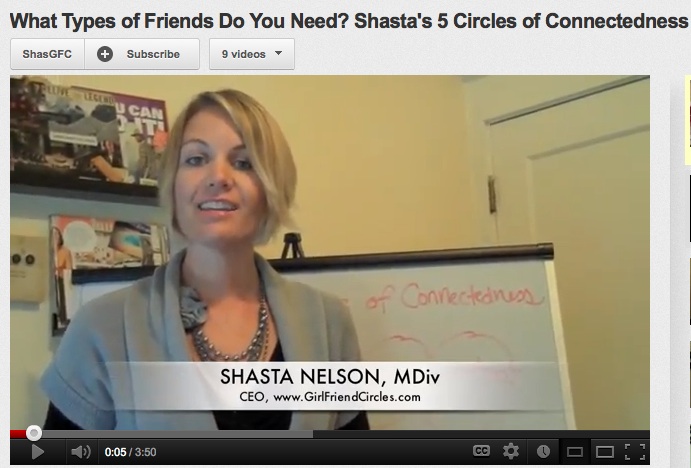Today I am tackling a question that came in on Monday. We can all learn so much from each others questions, even if our circumstances are different. Hope this is helpful! (And if you ever have a question you'd like me to weigh in on, ask it here.)
Dear Shasta,
My relationship with one of my bridesmaids is feeling strained and I'm wondering if I need to fire her even if it causes a loss of the relationship completely?
We've been friends for over 6 years and celebrated all kinds of things together, but since I was in her wedding in June, our relationship has felt strained. I felt pushed out on a few of her wedding events (only bridesmaid not asked to give a speech at the rehearsal dinner, the last bridesmaid to find out a lot of important information about some of the parties, etc.) and she had a falling out with a mutual friend of mine who happens to also be one of my bridesmaids. Drama!
A few weeks ago I went to see her face-to-face and asked what was wrong and she basically said, "The wedding is over so I'm over it." I finally got her to admit that she was upset about overhearing me talk about my upcoming wedding at her wedding. (But it was her mom who asked me questions about it! Ugh!) We were interrupted and never finished the conversation. We've hardly talked for two months except for her texting me to find out about what dress she needs to wear, etc.
Do I fire her? How do I do that? Help me!
Thanks,
Bride Not Feeling the Bridesmaid Love

Dearest Bride Not Feeling the Bridesmaid Love,
Oh I am so sorry that you're feeling such angst! None of us like dealing with this stuff at any time in our friendships, least of all during a season of life where we really want our friends loving us up!
I'm so proud of you for dealing with this and deciding to not just take the easy way out by putting up with it. She sounds like she's willing to just go through the motions, but you both deserve way more than that. What we don't want is for things to just stay the same-- we want this to either get obviously better or blatantly not.
Why It Might Be Fixable
To that end, I wrote an entire blog post today with the 4-steps I'd recommend in firing a bridesmaid, but I had a knot in my stomach the whole time. While I think that advice might be helpful to someone who does in fact need to end things, my intuition says that for you: this is a relationship you can salvage, dear Bride.
- Your willingness: You have proven by going to her house already that you have the skills necessary for healing this rift.
- Your history: You have been friends for quite a while and it has been meaningful and fulfilling. This fight doesn't sound like a chronic issue as much as one that is connected to specific circumstances and events. The fact that she is close enough to you to have been invited to be in the wedding says that this is a friendship that has mattered. If people matter that much-- then they're worth any level of awkward conversation first as we do our dogged best to repair that which is wounded.
- Her response: The fact that she tried to brush it off isn't healthy, but it's common and usually done out of her guilt for feeling the way she feels. My guess is that she wishes she weren't bothered by what bothered her. So while I wish she were more practiced at owning her feelings and sharing them with you... the truth is that she's probably trying to protect you from them. Which isn't a crime.
- The crime: Also, from what I can see, there was nothing malicious done, no screaming red flags saying that she's an awful person or that you have to protect yourself. She hasn't willfully or repetitively tried to hurt you. Rather, it appears that the relationship has suffered from hurt feelings on both sides (during an event that often comes with high emotions on both sides) and some miscommunication. Those are fixable issues.
Lean In, First
So, I'm taking the time to re-write this blog post, without trying to think of all the possible scenarios in which a bride and bridesmaid can fight (and I've heard the gammut!), and instead praying for the wisdom to write just for you. I'll have to trust that others will find their own truth.
I'll say it again that I find it so impressive that you went to her house and initiated a conversation, even willing to help push it past the niceties to hear hints at what the real issue was. Unfortunately, that step is all too rare in female friendships. I admire that you did it. But it doesn't sound like you were able to get far enough in that conversation to really bring peace to either of you... and in my opinion, it's worth you trying again.
We often make up a story about how "if they cared for us" then they would come to us or initiate. That's simply not true. The truth is that a lot of caring people out there hate conflict, aren't comfortable with their own feelings, or are so unpracticed at engaging in it that they avoid the awkwardness. They don't yet understand that intimacy isn't developed between two people because they avoid what might feel awkward, but because they lean into it. Many people don't yet know this secret... but more important than knowing it right now is whether they are willing to learn it by showing up with you and engaging when you hold the loving space for it.
So my advice: if you're willing to risk losing the relationship anyway, you might as well risk it for honesty and hope first, before risking it to simply walk away.
You used the word "firing" her as a bridesmaid which helps us recognize that if we were managers firing an employee, we'd hopefully have several conversations with the failing team member about what they could do to improve their performance before we booted them. If we'd face up to tough conversations with employees, detailing what we need to see, and asking how we can better support them-- then don't our closest friends deserve at least the same amount of willingness?
The Conversation
The value of another conversation is that it will force one of two outcomes: increased intimacy and bonding OR increased friction and disconnection. And it will do so in such a way that it is hopefully obvious to both of you. In this way, you're not so much firing her "out of the blue" as you are stating what is obvious to you both: "I need people surrounding me that day who are happy for me and excited with me; if you can't do that right now then it's not fair to either of us to pretend otherwise."
1) Open a conversation, again: If possible, you should do it in person; if not, then definitely on the phone because the goal is a conversation (back-and-forth) as opposed to the two separate monologues that emails create.
I always encourage starting with the hope, being honest, and then leaving an open-ended question. So that could look like: "I was hoping we could talk some more about what has happened between us so that we can hopefully get back to the place where we feel ease and joy between us. Last time we talked you said you had felt hurt because you overheard me answering questions about my wedding while we were at yours. I so didn't mean to upset you... is there anything we, or I, can do to help make that feel better? What do we need to do to fix this?"
Then be quiet and listen.
2) Keep leaning in. If she brushes it off and acts like everything is fine, then come right out and ask, "So you feel like everything is good between us? You don't feel like anything has changed?" Many of us feel guilty for feeling angry or disappointed so we're prone to try to swallow it rather than to talk about it. We can understand that fear and gently probe, assuring her that we'd prefer her honesty and that it's completely okay for her to have feelings.
If, on the other hand, she shares what she thinks will help, then listen and see if you're willing to do what she's asking. In most cases, she probably just wants to be validated and heard, so let go of worrying about whether you did anything wrong or not, and instead just try to hear her feelings. The more she can share, the less angst she'll feel with you. And it's okay for you to share what hurt your feelings, too. Just try not to dump that all at the beginning in a big opening monologue and instead share it only if the conversation gets off to a good start where you're both sharing and hearing.
Try to not cut this conversation short just because it's uncomfortable, but rather trust that greater intimacy could be on the other side of this conflict. (My book next April is all about the relationship between conflict and intimacy so I can't wait to share it with you!!!) Most of us aren't super practiced at tough conversations so we're anxious to pull away, but staying in this space (and trying to stay as loving as possible while there) is soul-growing and relationship-bonding!
3) End well. If you feel like you both shared honestly and have been able to answer the question, "What do we do now to rebuild the love?" then hallelujah!!! Schedule fun time together as soon as possible and intentionally add more positivity back into your friendship to off-balance the weariness.
If not, then ask the tough question: "Do you see us getting past this to a place where you sincerely feel like you can be excited for me and cheer for me at my wedding?"
Her answer will give you a lot of information and hopefully call her to either help offer a solution or agree with you that this isn't going to be repaired in time to stand up beside you in celebration.
If she expresses doubt then you're able to follow it up with, "I hope we can at some point, I really do. I have so valued our friendship. But unfortunately I want bridesmaids who are all in... excited for me and confident in our friendship. It's not fair to either of us to have you go through all the trouble of being a bridesmaid just to have us going through the motions."
Depending on how the conversation went, it may not feel super good right away since you likely both stretched beyond your comfort zones. (Like how we might feel sore the day after exercising!) But whether it fixes the issue at hand, or not, rest assured that you practiced a super crucial skill that this world needs more of-- the ability to show up with tenderness and be seen, even when hurt.
It is not wasted time or energy; it is not to no avail. No matter the outcome, this process will invite you both to increased growth, which whether it's the last gift you give each other as friends, or the next step to greater closeness with each other-- it is good.
And my gut says that you two can pull this off. She doesn't have to be perfect and all the other bridesmaids don't have to be close to her, she just has to be able to step back into loving you in a way that assures you that she's standing up there saying, "I've got your back." May it be so.
I hope that you are soon "Bride Who Is Feeling Lots of Love"-- you deserve it.
xoxo
Shasta
p.s. Write me an update if you can! And congratulations on your wedding day!


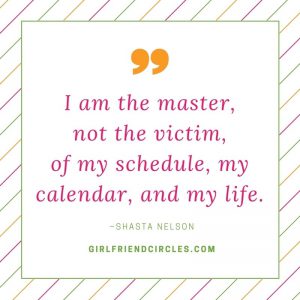
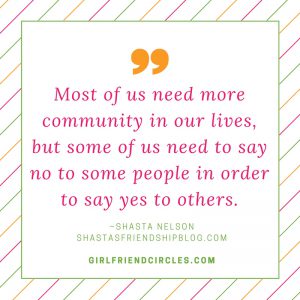 need to say no to some people in order to say yes to others.
need to say no to some people in order to say yes to others.
